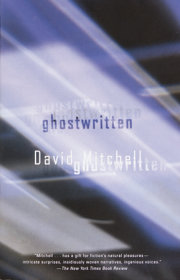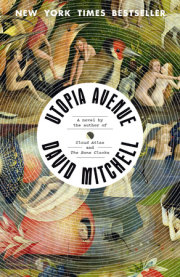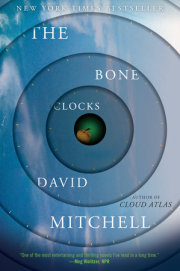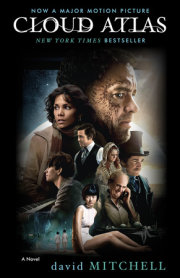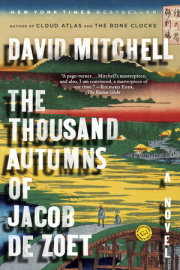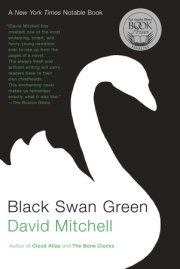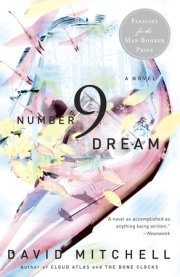OKINAWAWho was blowing on the nape of my neck?
I swung around. The tinted glass doors hissed shut. The light was bright. Synthetic ferns swayed, very gently, up and down the empty lobby. Nothing moved in the sun-smacked car park. Beyond, a row of palm trees and the deep sky.
"Sir?"
I swung around. The receptionist was still waiting, offering me her pen, her smile as ironed as her uniform. I saw the pores beneath her make-up, and heard the silence beneath the muzak, and the rushing beneath the silence.
"Kobayashi. I called from the airport, a while ago. To reserve a room." Pinpricking in the palms of my hands. Little thorns.
"Ah, yes, Mr. Kobayashi. . ." So what if she didn't believe me? The unclean check into hotels under false names all the time. To fornicate, with strangers. "If I could just ask you to fill in your name and address here, sir ... and your profession?"
I showed her my bandaged hand. "I'm afraid you'll have to fill the form in for me."
"Certainly ... My, how did that happen?"
"A door closed on it."
She winced sympathetically, and turned the form around. "Your profession, Mr. Kobayashi?"
"I'm a software engineer. I develop products for different companies, on a contract-by-contract basis."
She frowned. I wasn't fitting her form. "I see, no company as such, then . . ."
"Let's use the company I'm working with at the moment." Easy. The Fellowship's technology division will arrange corroboration.
"Fine, Mr. Kobayashi...Welcome to the Okinawa Garden Hotel."
"Thank you."????????
"Are you visiting Okinawa for business or for sightseeing, Mr. Kobayashi?" ????????
Was there something quizzical in her smile? Suspicion in her face?
"Partly business, partly sightseeing. "I deployed my alpha control voice.
"We hope you have a pleasant stay. Here's your key, sir. Room 307. If we can assist you in any way, please don't hesitate to ask."
You? Assist me? "Thank you."
Unclean, unclean. These Okinawans never were pureblooded Japanese. Different, weaker ancestors. As I turned away and walked toward the elevator, my ESP told me she was smirking to herself. She wouldn't be smirking if she knew the caliber of mind she was dealing with. Her time will come, like all the others.
Not a soul was stirring in the giant hotel. Hushed corridors stretched into the noontime distance, empty as catacombs.
There's no air in my room. Use of air-conditioning is prohibited in Sanctuary because it impairs alpha waves. To show solidarity with my brothers and sisters, I switched it off and opened the windows. The curtains I keep drawn. You never know whose telephoto lens might be looking in.
I looked out into the eye of the sun. Naha is a cheap, ugly city. But for the background band of Pacific aquamarine this city could be any tentacle of Tokyo. The usual red-and-white TV transmitter, broadcasting the government's subliminal command frequencies. The usual department stores rising like windowless temples, dazzling the unclean into compliance. The urban districts, the factories pumping out poison into the air and water supplies. Fridges abandoned in wastegrounds of lesser trash. What grafted-on pieces of ugliness are their cities! I imagine the New Earth sweeping this festering mess away like a mighty broom, returning the land to its virginal state. Then the Fellowship will create something we deserve, which the survivors will cherish for eternity.
I cleaned myself and examined my face in the bathroom mirror. You are one such survivor, Quasar. Strong features, highlighting my samurai legacy. Ridged eyebrows. A hawkish nose. Quasar, the harbinger. His Serendipity had chosen my name prophetically. My role was to pulse at the edge of the universe of the faithful, alone in the darkness. An outrider. A herald.
The extractor fan droned. Somewhere beyond its drone I could hear a little girl, sobbing. So much sadness in this twisted world. I began shaving.
I awoke early, not remembering where I was for the first few moments. Jigsaw pieces of my dream lay dropped around. There had been Mr. Ikeda, my home-room teacher from high school, and two or three of the worst bullies. My biological father had appeared too. I remembered that day when the bullies had got everyone in the class to pretend that I was dead. By afternoon it had spread through the whole school. Everyone pretended they couldn't see me. When I spoke they pretended they couldn't hear me. Mr. Ikeda got to hear about it, and as a society-appointed guardian of young minds what did he take it upon himself to do? The bastard conducted a funeral service for me during the final home-room hour. He'd even lit some incense, and led the chanting, and everything.
Before His Serendipity lit my life I was defenseless. I sobbed and screamed at them to stop, but nobody saw me. I was dead.
After awakening, I found I was tormented with an erection. Too much gamma wave interference. I meditated under my picture of His Serendipity until it had subsided.
If it's funerals the unclean want, they shall have them aplenty, during the White Nights, before His Serendipity rises to claim his kingdom. Funerals with no mourners.
I walked down the Kokusai Dori, the main street of the city, doubling back and weaving off to lose anybody who was trailing me. Unfortunately my alpha potential is still too weak to achieve invisibility, so I have to shake trailers the old-fashioned way. When I was sure nobody was following me I ducked into a games center and placed a call from a telephone booth. Public call boxes are much less likely to be bugged.
"Brother, this is Quasar. Please connect me with the minister of defense."
"Certainly, brother. The minister is expecting you. Permit me to congratulate you on the success of our recent mission."
I was put on hold for a couple of moments. The minister of defense is a favorite of His Serendipity's. He graduated from the Imperial University. He was a judge, before hearing the call of His Serendipity. He is a born leader. "Ah, Quasar. Excellent. You are in good health?"
"On His Serendipity's service, Minister, I always enjoy good health. I have overcome my allergies, and for nine months I haven't suffered from-"
"We are delighted with you. His Serendipity is mightily impressed with the depth of your faith. Mightily impressed. He is meditating on your anima now, in his retreat. On yours alone, for fortification and enrichment."
"Minister! I beg you to convey my deepest thanks."
"Gladly. You've earned it. This is a war against the unclean myriad, and in this war acts of courage do not go unacknowledged, nor unrewarded. Now. You'll be wondering how long you are to remain away from your family. The Cabinet believes seven days will suffice."
"I understand, Minister." I bowed deeply.
"Have you seen the television reports?"
"I avoid the lies of the unclean state, Minister. For what snake would willingly heed the voice of the snakecharmer? Even though I am away from Sanctuary, His Serendipity's instructions are inscribed in my heart. I imagine we have caused a stir among the hornets."
"Indeed. They are talking about terrorism, showing the unclean foaming at the mouth. The poor animals are almost to be pitied-almost. As His Serendipity predicted, they are missing the point that it is their sins being visited on their heads. Be proud, Quasar, that you were one of the chosen ministers of justice! The 39th Sacred Revelation: Pride in one's sacrifice is not a sin but selfrespect. Keep a low profile, nonetheless. Blend in. Do a little sightseeing. I trust your expense account will suffice?"
"The treasurer was most generous, and my needs are simple."
"Very good. Contact us again in seven days. The Fellowship looks forward to welcoming our beloved brother home."
I returned to the hotel for my midday cleaning and meditation. I ate some crackers, seaweed snacks and cashew nuts, and drank green tea from a vending machine outside my room. When I went out again after lunch the unclean receptionist gave me a map, and I chose a tourist spot to visit.
The Japanese naval headquarters was set in a scrubby park at the top of a hill overlooking Naha, to the north. During the war it had been so well hidden that it took the invading Americans three weeks after they had seized Okinawa to stumble across it. The Americans are not a very bright race. They miss the obvious. Their embassy had the effrontery to deny His Serendipity a residence visa ten years ago. Now, of course, His Serendipity can come and go where he pleases using subspace conversion techniques. He has visited the White House several times, unhindered.
I paid for my ticket and went down the steps. The dim coolness welcomed me. A pipe somewhere was dripping. There was one more surprise waiting for the American invaders. In order to die an honorable death, the full contingent of four thousand men had taken their own lives. Twenty days previously.
Honor. What does this frothy, idol-riddled world of the unclean know of honor? Walking through the tunnels I stroked the walls with my fingertips. I stroked the scars on the wall, made by the grenade blasts and the picks that the soldiers had used to dig their stronghold, and I felt true kinship with them. The same kinship I feel at Sanctuary. With my enhanced alpha quotient, I was picking up on their anima residue. I wandered the tunnels until I lost track of the time.
As I left that memorial to nobility a coachload of tourists arrived. I took one look at them, with their cameras and potato-chip packets and their stupid Kansai expressions and their limbless minds with less alpha capacity than a housefly, and I wished that I had one more phial of the cleansing fluid left, so that I could lob it down the stairs after them and lock them in. They would be cleansed in the same way that the money-blinded of Tokyo had been cleansed. It would have appeased the souls of the young soldiers who had died for their beliefs decades ago, as I had been ready to do only seventy-two hours ago. They were betrayed by the puppet governments that despoiled our land after the war. As have we all been betrayed by a society evolving into markets for Disney and McDonald's. All that sacrifice, to build what? To build an unsinkable aircraft carrier for the United States.
But I had no phials left, and so I had to endure those unclean, chattering, defecating, spawning, defiling, cretins. Literally, they made me gasp for air.
I walked back down the hill under the palm trees.
Copyright © 2001 by David Mitchell. All rights reserved. No part of this excerpt may be reproduced or reprinted without permission in writing from the publisher.


